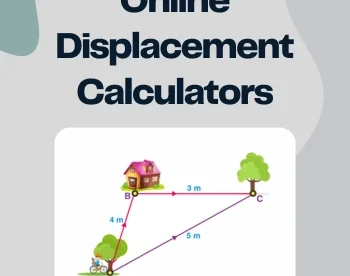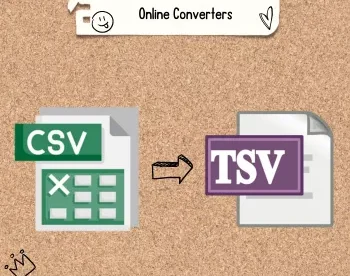4 Best Free Online Proxy Extractor Tools
Here is a list of the best free online proxy extractor tools. A proxy is an intermediary server between a device and the internet. It acts as a gateway and forwards the requests on behalf of the user. In other words, it connects the user to a website through a proxy server. The website sees the proxy IP address instead of your actual IP address. Thus proxy can enhance privacy, bypass internet restrictions, and cache content for improved performance. In this post, we talk about proxy extractors.
A proxy extractor is an online tool that extracts all the proxies from raw text or a web page. This can help you see all the proxies neatly listed in one place. This post covers 4 proxy extractor tools that you can use to scrape proxies. Some of these tools support multiple inputs such as text, file, and URL whereas some are limited to raw text covering HTML and XML as well. The output of each tool gives you a list of extracted proxies in plain IP:PORT format.
My Favorite Online Proxy Extractor Tool
ProxyNova.com is my choice of tool to extract proxies online. This tool can easily extract proxies from raw text as well as URLs. You can add multiple URLs and get a list of all the proxies from those web pages.
You can check out our other lists of the best free Online Bulk Proxy Checker Websites, Open Source VPN Client Software For Windows, IP Address Hider Software For Windows.
Comparison Table:
| Name | Supported Input | Proxy Count |
|---|---|---|
| ProxyNova.com | Raw Text / URLs | ✓ |
| ProxyDB.net | Raw Text | x |
| MyToolz.net | Raw Text / File | ✓ |
| Wiremask.eu | Raw Text | ✓ |
ProxyNova.com
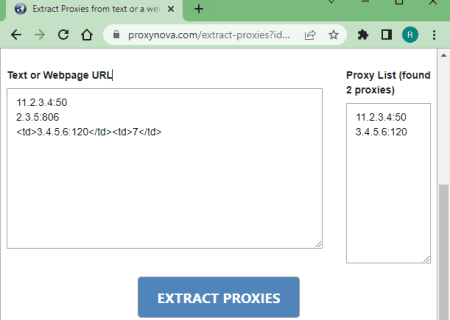
ProxyNova.com is a website that provides free proxy services and information about using proxies for various purposes. It offers a list of open proxy servers that are updated every minute and available for free. This website has various proxy tools as well including an Online Proxy Scraper. This tool can extract a list of proxies from any raw text or a website. You can directly paste the raw text or add URLs to scrape proxies from web pages. The tool extracts all the proxies and lists them in IP:PORT format. At the top of the list, it also shows the total number of proxies extracted. With that, this is a quick and handy tool to extract proxies.
Steps to extract proxy online on ProxyNova.com:
- Go to this Online Proxy Scraper tool on ProxyNova. A link to the same is added below,
- Paste your raw data or URLs into the input section on the left side of the screen.
- Then click the Extract Proxies button to get a list of all the proxies from your input.
Highlights:
- Supported Input: Raw Text and URLs.
- Proxy Count: Yes, it shows the total number of extracted proxies.
ProxyDB.net
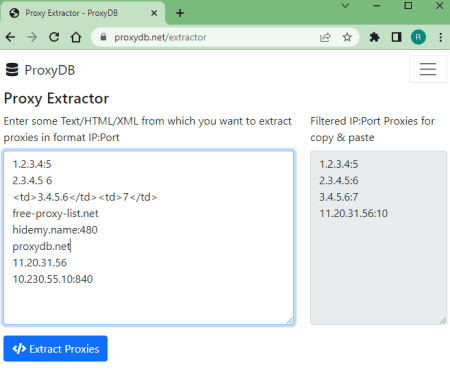
ProxyDB.net is another website that provides a list of open proxy servers. The list gets updated regularly and can be filtered by attributes such as the country of origin, protocol, and anonymity level. This website offers a Proxy Extractor tool that you can use to extract proxies from Text, HTML, and XML. You can directly paste your raw text into the tool and run the extractions. Within a second, it extracts all the proxies from the input and lists them on the screen. It lists the proxies in IP:Port format that you can easily select and copy.
Steps to extract proxy online on ProxyDB.net:
- Head over to this Proxy Extractor tool on ProxyDB using the link provided below.
- Paste your raw text, HTML, or XML data into tho the text box there.
- Then click the Extract Proxies button. This gives you a list of all the proxies on the right side of the screen.
Highlights:
- Supported Input: Raw Text covering HTML/XML, etc.
- Proxy Count: No, it does not show the total count.
MyToolz.net
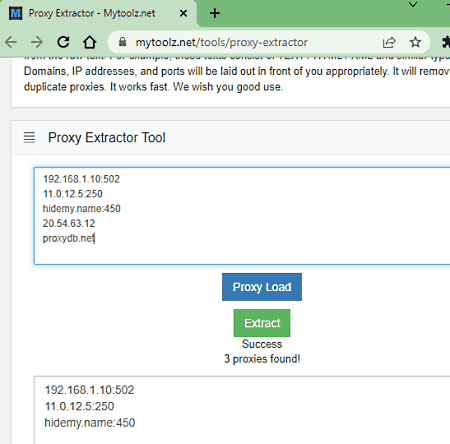
MyToolz.net is another free website that offers a collection of online tools. It has a Proxy Extractor Tool that you can use to scrape proxies from raw text or a file. The tool has input and output sections in a vertical arrangement. In between the sections, you get two buttons; Proxy Load and Extract. In the case of raw text, you can directly paste that and extract the proxies. But if you have a file then you have to use the Proxy Load button to upload the file. The tool fetches the text from the file and loads that in the input section. Upon extraction, it lists all the proxies in the output section following IP:Port format. It also gives you the total number of proxies extracted from the input.
Steps to extract proxy online on MyToolz.net:
- You can use the link added below to direct visit this Proxy Extractor tool on MyTools.net.
- Paste your raw text into the box at the top there. Alternatively, you can use the Proxy Load button to upload a file for raw data.
- After that, click the Extract button to extract and list all the proxies.
Highlights:
- Supported Input: Raw Text or File Upload.
- Proxy Count: Yes, it shows the number of extracted proxies.
Wiremask.eu
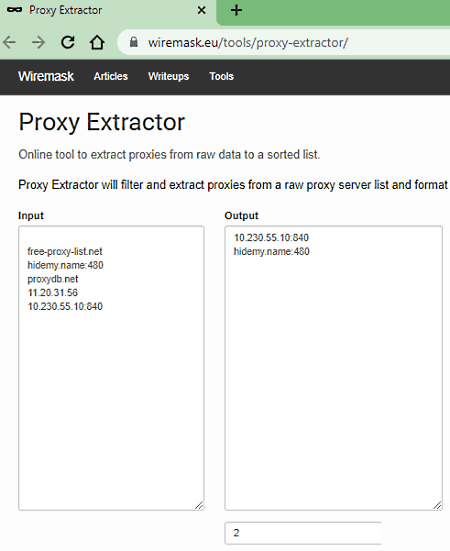
Wiremask.eu is a free website that provides free articles and tools about computer and network security. The website features an online Proxy Extractor tool that extracts proxies from raw data to a sorted list. This tool takes any type of raw text and extracts the proxies from that. It has input and output sections side by side. You add the raw data in the input section and get the list of extracted proxies in the output section. Below the extracted proxy list, it shows the proxy count as well. This tool also follows the IP:Port format for the proxies.
Steps to extract proxy online on Wiremask.eu:
- Open this Proxy Extractor tool in your web browser by clicking on the “Home Page” button below.
- In the Input section on the left, paste your raw input data.
- This tool immediately lists all the proxies in the Output section.
Highlights:
- Supported Input: Text/HTML/XML, etc.
- Proxy Count: Yes, it shows the total proxy count.
Frequently Asked Questions
A proxy server acts as an intermediary between a user's device and the internet, forwarding user requests to web servers and returning the responses back to the user. It helps hide the user's IP address, enhances security and privacy, and can be used for caching content to improve performance.
No, a VPN (Virtual Private Network) and a proxy server are not the same. A VPN creates a secure and encrypted connection between the user's device and a remote server, while a proxy server acts as an intermediary that forwards user requests to web servers without necessarily encrypting the data.
A proxy IP address is the IP address of a proxy server, which serves as an intermediary between a user's device and the internet. When a user connects to a website through a proxy server, the website sees the proxy IP address instead of the user's actual IP address, helping to hide the user's identity and location.
Yes, the main reason people use proxy servers is to hide an IP address.
Proxy servers can be safe when used properly for legitimate purposes, such as enhancing privacy or accessing region-restricted content. However, using untrustworthy or poorly configured proxy servers may expose your data to security risks and potential misuse of your information. From privacy violations to malware, a free proxy server could expose users to various security issues.
A proxy port is a specific numerical address used by proxy servers to listen for incoming connections and forward traffic between the user's device and the internet. It acts as an endpoint for communication, enabling users to configure their devices to connect to the proxy server using the designated port number.
Proxy code refers to a piece of software or configuration used to set up and manage proxy servers. It facilitates the communication between clients and servers, forwarding requests and responses while adding security and anonymity features to the internet traffic.
Proxy Servers help hide the user's IP address, enhance security and privacy, and can be used for caching content to improve performance.
In general, a proxy is often faster than a VPN because it doesn't involve encryption, reducing the overhead. However, the actual speed depends on factors like the location of the proxy/VPN server and the quality of the network, so performance may vary.
Proxies are not inherently illegal; they serve legitimate purposes like enhancing privacy and bypassing regional restrictions. However, they can be misused for illegal activities, such as unauthorized access to restricted content or for cybercrimes, leading to potential legal issues for those engaging in unlawful activities through proxies.
About Us
We are the team behind some of the most popular tech blogs, like: I LoveFree Software and Windows 8 Freeware.
More About UsArchives
- May 2024
- April 2024
- March 2024
- February 2024
- January 2024
- December 2023
- November 2023
- October 2023
- September 2023
- August 2023
- July 2023
- June 2023
- May 2023
- April 2023
- March 2023
- February 2023
- January 2023
- December 2022
- November 2022
- October 2022
- September 2022
- August 2022
- July 2022
- June 2022
- May 2022
- April 2022
- March 2022
- February 2022
- January 2022
- December 2021
- November 2021
- October 2021
- September 2021
- August 2021
- July 2021
- June 2021
- May 2021
- April 2021
- March 2021
- February 2021
- January 2021
- December 2020
- November 2020
- October 2020
- September 2020
- August 2020
- July 2020
- June 2020
- May 2020
- April 2020
- March 2020
- February 2020
- January 2020
- December 2019
- November 2019
- October 2019
- September 2019
- August 2019
- July 2019
- June 2019
- May 2019
- April 2019
- March 2019
- February 2019
- January 2019
- December 2018
- November 2018
- October 2018
- September 2018
- August 2018
- July 2018
- June 2018
- May 2018
- April 2018
- March 2018
- February 2018
- January 2018
- December 2017
- November 2017
- October 2017
- September 2017
- August 2017
- July 2017
- June 2017
- May 2017
- April 2017
- March 2017
- February 2017
- January 2017
- December 2016
- November 2016
- October 2016
- September 2016
- August 2016
- July 2016
- June 2016
- May 2016
- April 2016
- March 2016
- February 2016
- January 2016
- December 2015
- November 2015
- October 2015
- September 2015
- August 2015
- July 2015
- June 2015
- May 2015
- April 2015
- March 2015
- February 2015
- January 2015
- December 2014
- November 2014
- October 2014
- September 2014
- August 2014
- July 2014
- June 2014
- May 2014
- April 2014
- March 2014

